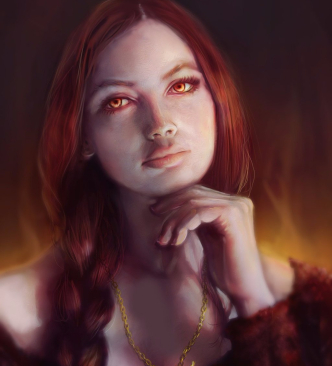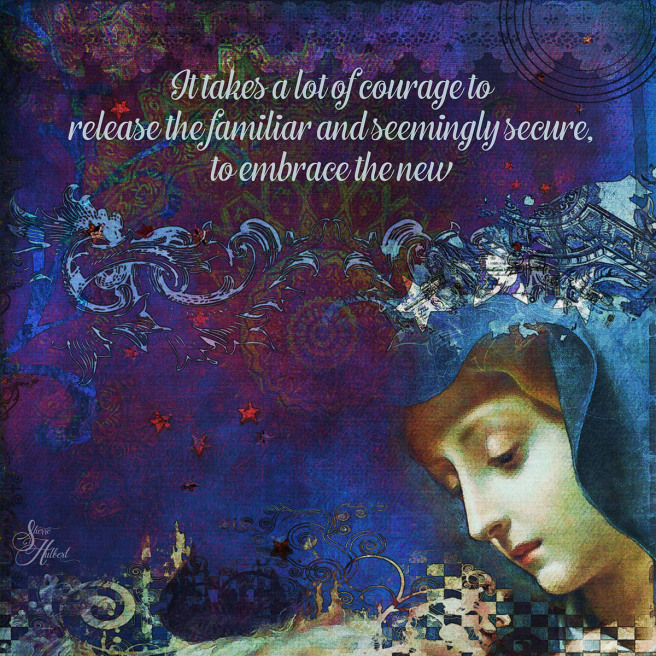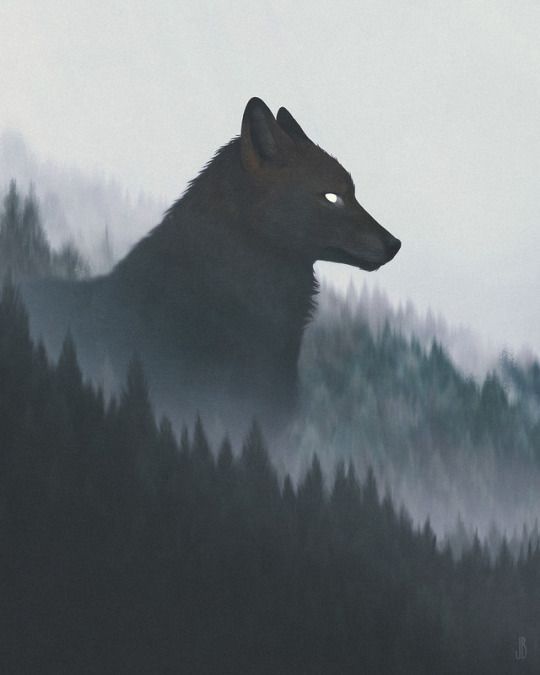 “Melisandre” by waldziur
“Melisandre” by waldziur
It is prophesied that a legendary hero, Azor Ahai, shall be reborn amidst the darkness of the Long Night, as had happened before, to bring the dawn once again. Many have speculated him to be Jon, Daenerys, Stannis, Jaime, and a whole slew of other characters.
I’ll get to a few guesses on who Azor Ahai is later on, but for now, we’re going to focus on Nissa Nissa.
Because, if Azor Ahai is prophesied to be reborn, why not Nissa Nissa?
Salladhor Saan once recounted the tale of Azor Ahai and Nissa Nissa to Davos. Basically, there’s a man, a woman, and his sword. The man takes his sword and plunges it into the woman’s breast, killing her, so when he draws it out, Lightbringer is born.
Once stripped down, the legend can fit with anyone, even Melisandre. And I’ve stripped the legend down to its bare bones because, after all, it is merely legend, something that I believe happened long ago in the world of A Song of Ice and Fire – but something that I believe has been embellished, made romantically tragic, and thus palatable to be spread and endure.
But What About Love?Azor Ahai loved Nissa Nissa…
… Or so the story goes. People do love their tragic stories.
That’s why a singer sung a ballad about two lovers dying amongst the Doom of Valyria at Joffrey and Margaery’s wedding. At a wedding. A depressing and “haunting” – according to Tyrion – ballad.
Why risk your life in the presence of a reputably mad king if you didn’t know everyone was going to love the song?
That’s because the singer knew people love stories of love and death and sad endings because it makes them feel. They don’t care if it makes them feel terribly sad; poignancy is just the surest way to a human’s heart and that’s the route most storytellers will go… and legends go through many storytellers.
Love is even added to legends where there is none at all. Take the one of Beric Dondarrion and Lady Stoneheart for example. In the books, it is said they are lovers:
And there’s this other band, led by this woman Stoneheart . . . Lord Beric’s lover, according to one tale.
… And they never even met. The irony of this legend is that the least believable part is true:
“… but Dondarrion kissed her and brought her back to life, and now she cannot die, no more than he can.”
What I’m getting at is this: A Song of Ice and Fire is a world where stories and myths are built around unadorned, ugly truths and romanticized. It is up to people in it – and us, I guess – to pick apart the small kernels of truths from these fantastic fables and deduce what could have occurred in practicality.
But, being a fantasy world, sometimes those truths are magic – such as Beric resurrecting Lady Stoneheart.
So, Nissa Nissa probably wasn’t her name. She probably wasn’t in love – like Beric and Stoneheart. Azor Ahai probably wasn’t even her husband — they might not even have known each other until the moment of her death. I even doubt he labored long at all to forge the sword or slew a lion – but this part sure teaches perseverance and hard work – I’m sure the smallfolk love hearing it.
Grand and tragic tales are crafted around unpalatable stories to be made palatable in order for the legends to endure. It’s not by design – smallfolk and gossipers don’t plan this out. It’s only human nature to assign more meaning to something, one method being adding love and tragedy.
Legends are embellished things, but there is truth amidst it all, as I said. Beric sure didn’t love Stoneheart but he did give her a kiss and bring her back to life. Similarly, I don’t think Azor Ahai loved Nissa Nissa at all but he did likely kill her to draw forth Lightbringer. Put two people of opposite sex together in once place and people will gossip and spin their yarn. It’s only human nature.
Sacrifice Is EasyEven so, you might say… Isn’t sacrifice a crucial component of sorcery? Surely someone must love Melisandre for her to be Nissa Nissa and it to be sacrifice? If sacrifice is easy, then it is no true sacrifice, as Stannis once said.
Yet there’s a little spider’s experience that contradicts just this:
“One day at Myr, a certain man came to our folly. After the performance, he made an offer for me that my master found too tempting to refuse. … With a long hooked blade, he sliced me root and stem, chanting all the while. I watched him burn my manly parts on a brazier. The flames turned blue, and I heard a voice answer his call, though I did not understand the words they spoke.
Varys’ manhood was sacrificed to the flames. His manhood alone was enough sacrificial power appease whatever it was that spoke in the flames.
As such, I don’t believe sacrifice requires any emotional bond being severed – like killing a loved one. This sacrifice didn’t. The sorcerer didn’t love Varys. He just saw him and bought him off the street, and after he was done he simply threw him back out.
Not very appealing story, though, is it?
Fire Made FleshNow, while I don’t think love is a crucial component of the forging of Lightbringer, I do think Nissa Nissa has to be someone special, someone… mystical, for lack of a better word. And who’s more mystical than the red woman from Asshai?
First of all, let’s look at a particular aspect that Lightbringer and Nissa Nissa both share:
Thereafter Lightbringer was never cold to the touch, but warm as Nissa Nissa had been warm.
Now, let’s look at Melisandre:
The priestess did not speak, but she slowed her pace deliberately, and where she walked the ice began to drip. He [Jon Snow] will not fail to notice that.
Melisandre seems to emit warmth as Nissa Nissa once did, supposedly. What is curious about this is that Melisandre implies this is something no one else – or few others – can do. It seems to be a natural aspect to her being, as all she did is was walk.
So is there something that burned inside Nissa Nissa, something that now burns inside Melisandre, something that can usher forth Lightbringer?
Is she a being of fire?
—
One night, while peering through the flames for visions, Melisandre saw a man with a wooden face and a thousand eyes, and a boy with a wolf’s face – Bloodraven and Bran. They are not necessarily important right now, but what happened to Melisandre is notable:
The red priestess shuddered. Blood trickled down her thigh, black and smoking. The fire was inside her…
Black and smoking blood.
There’s only one other being that bleeds as such. Beings described as “fire made flesh” for the fire that is born inside them:
The dragon gave one last hiss and stretched out flat upon his belly. Black blood was flowing from the wound where the spear had pierced him, smoking where it dripped onto the scorched sands.
But, you might say, that just might mean Melisandre is undead, like Coldhands. After all, it is he who said that after a man dies his blood turns black.
Yet he also said the blood thickens and congeals.
If Mel was such an undead her blood would not “trickle” because it would congealed. Yet it did.
Cracks and ScreamsNow, if Melisandre is a being of fire, and if Nissa Nissa was a being of fire… does that make them Others of Fire?
Call them what you will, but I’ll just compare them to our established, icy Others.
After fleeing from the battle at the Fist of the First Men, Sam and his company are ambushed by an Other. Sam stabs with it with a dragonglass dagger, ultimately killing it… And thus, we are presented with the singular death throes of an elemental being:
He heard a crack, like the sound ice makes when it breaks beneath a man’s foot, and then a screech so shrill and sharp that he went staggering backward with his hands over his muffled ears, and fell hard on his arse.
When Nissa Nissa was stabbed, this is what purportedly happened:
It is said that her cry of anguish and ecstasy left a crack across the face of the moon.
Notice the word “crack” used in both instances, and the inhuman loudness assigned to their screams.
Nissa Nissa’s cry of anguish and ecstasy was so loud, much like the Other’s death screams, that it could be said to have left a crack across the face of the moon – or there was an actual cracking sound, as in the Other’s case… but perhaps whomever heard it spun their yarn and assigned to the moon breaking.
If both Nissa Nissa and the slain white walker were Others, then perhaps it makes sense that their death throes were both inhumanly similar in nature.
Cold Blade, Hot BladeNot only that, but when both Nissa Nissa and the Other were stabbed, the weapon used to slay them emerged changed, afterwards.
After Sam uses the dragonglass dagger, our favorite knucklehead tries to pick it up:
Grenn bent to scoop it up and flung it down again at once. “Mother, that’s cold.”
Of course it’s obvious why it’s cold – the Others are Ice personified, and anything that slides inside a cold object gets cold itself.
I’m not saying the dagger magically absorbed the cold and became “Coldbringer.”My point is the legend.
Let’s say, if this were to be turned into a legend, and yarn spun, couldn’t an imaginative mind say something along the lines of:
Thereafter [the dragonglass dagger] was never [warm] to the touch, but [cold] as the [Other] had been [cold].
It could have been another legend born out of the slaying of an Other, like Nissa Nissa.
Even so, we can still go down the tinfoil route and entertain the notion of “Coldbringer.” Because, in the show, a dragonglass dagger plunged into a man’s chest gives him the cold power.
Is it too far-fetched to suggest that, in the books, the dragonglass may also reabsorb it?
Of course, dragonglass is called “frozen fire” for a reason. What apparently occurred was the fire simply melted the Other away. Not to mention, Grenn was able to pick up the dagger again later… so probably no “Coldbringer” anytime soon.
Yet, as a glass candle, dragonglass can be used to see across mountains, seas and deserts, give men visions and dreams to communicate with one another half a world apart.
So who knows what other magical properties dragonglass may possess.
Pain and EcstasyNow, let’s bring the red woman back into the equation.
As you know, one night, while peering through the flames for visions, Melisandre saw Bloodraven and Bran. They are not necessarily relevant, again, but what Melisandre felt inside and out after seeing them is:
The red priestess shuddered. Blood trickled down her thigh, black and smoking. The fire was inside her, an agony, an ecstasy, filling her, searing her, transforming her. Shimmers of heat traced patterns on her skin, insistent as a lover‘s hand….
Agony and ecstasy. An allusion to a lover.
Now let’s look back at what the two primary feelings Nissa Nissa felt being stabbed by her lover:
‘Nissa Nissa,’ he said to her, for that was her name, ‘bare your breast, and know that I love you best of all that is in this world.’ She did this thing, why I cannot say, and Azor Ahai thrust the smoking sword through her living heart. It is said that her cry of anguish and ecstasy left a crack across the face of the moon…
Anguish and ecstasy; agony and ecstasy.
I dare say this is not a coincidence, for Melisandre has felt these simultaneously before, with Davos as witness as she birthed a shadow baby.
Panting, she squatted and spread her legs. Blood ran down her thighs, black as ink. Her cry might have been agony or ecstasy or both.
The lover’s hand in Mel’s part, I believe, was an allusion not to a love that actually existed, but an allusion to a legend purported to have love — Azor Ahai and Nissa Nissa.
Variously NamedThe shadows birthed by Melisandre can lead us to another conclusion, another connection to the legend:
Whomever slays Melisandre may also be described as the one who vanquished shadows.
Maester Yandel, in The World of Ice and Fire, implies that Azor Ahai had many names in many cultures, that essentially they were one in the same:
How long the darkness endured no man can say, but all agree that it was only when a great warrior—known variously as Hyrkoon the Hero, Azor Ahai, Yin Tar, Neferion, and Eldric Shadowchaser—arose…
Shadowchaser.
If someone, say Davos for instance, who finds her shadow-birthing detestable, ends up killing Melisandre… wouldn’t the name Shadowchaser be apt for this slayer?
He would be the hero who slew the mother of shadows, and therefore rid the world of their menace… essentially, chasing them away.
Who is Azor Ahai?I’m not sure Davos is Azor Ahai, and I have no textual evidence to offer and say, I think this other character is.
However, if you still want entertain the notion of love being a crucial part of the forging of Lightbringer, I can oblige you. For, if you think nobody loves Melisandre, you are… half wrong:
“Thank you.” Melisandre took a sip, swallowed, and gave the boy [Devan Seaworth] a smile. That made him blush. The boy was half in love with her, she knew. He fears me, he wants me, and he worships me.
I don’t believe Devan to be Azor Ahai, of course.
But if there’s anyone who would hesitate to kill Melisandre, it would be Devan. And if he wants her so bad, worships her, even, it would be a sacrifice to kill her.
Now, speaking of Seaworths, there’s the father who would kill Melisandre without a second thought:
“No jest. I mean to kill her.” If she can be killed by mortal weapons. Davos was not certain that she could. … A knife in the heart, though . . . even demons can be killed by cold iron, the singers say.
Through the heart, through the breast… like Nissa Nissa? And calling her a demon, that’s interesting. Jon Snow calls her a monster, although inadvertently, according to one theory:
The king [Stannis] can be harsh and unforgiving, aye, but a babe still on the breast? Only a monster would give a living child to the flames.
It seems Jon would kill that monster should it ever do that. Funnily enough, he later recalls a tale of Azor Ahai, in which he slew a monster:
Once Azor Ahai fought a monster. When he thrust the sword through the belly of the beast, its blood began to boil. Smoke and steam poured from its mouth, its eyes melted and dribbled down its cheeks, and its body burst into flame.
Of course the sword he wielded is implied to have been Lightbringer before he fought the monster. Still… that demon he fought seemed to have had a fire burning inside it… much like Melisandre.
Advertisements Share this:




